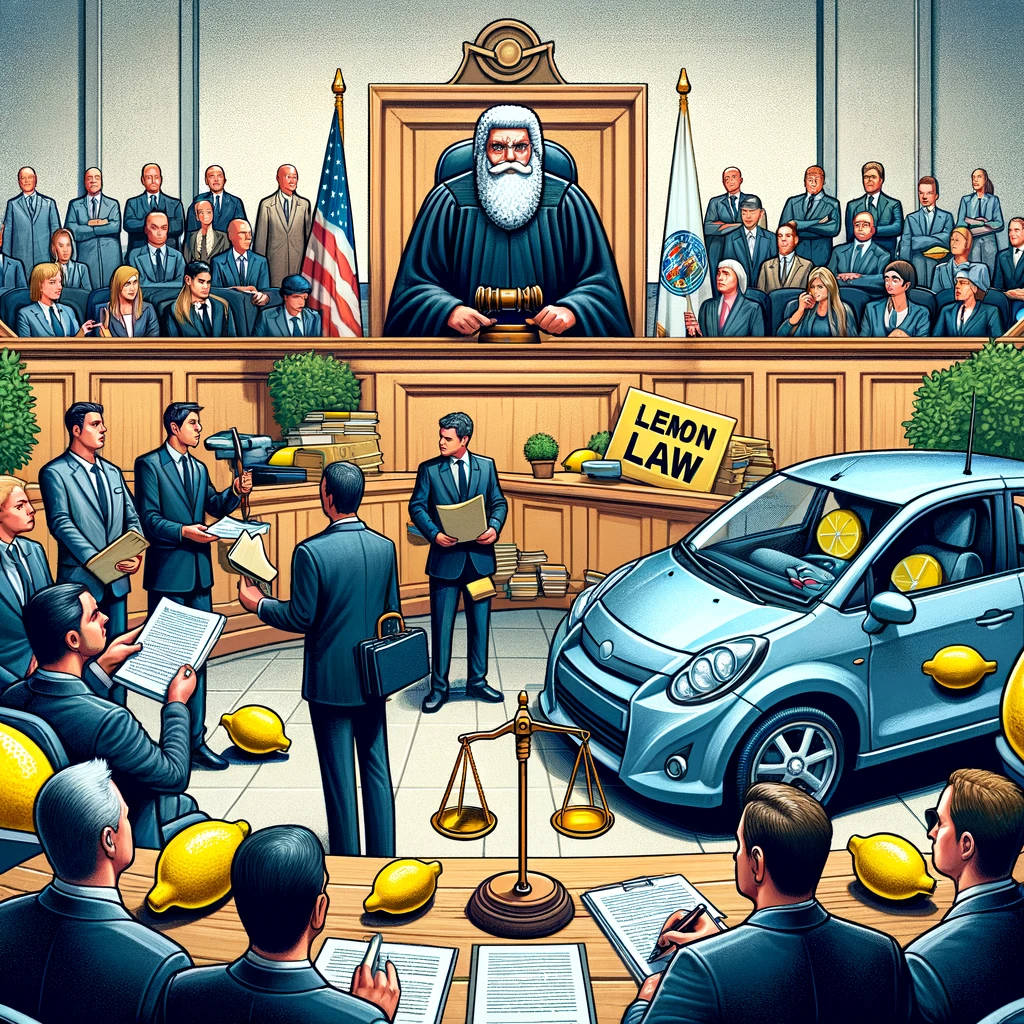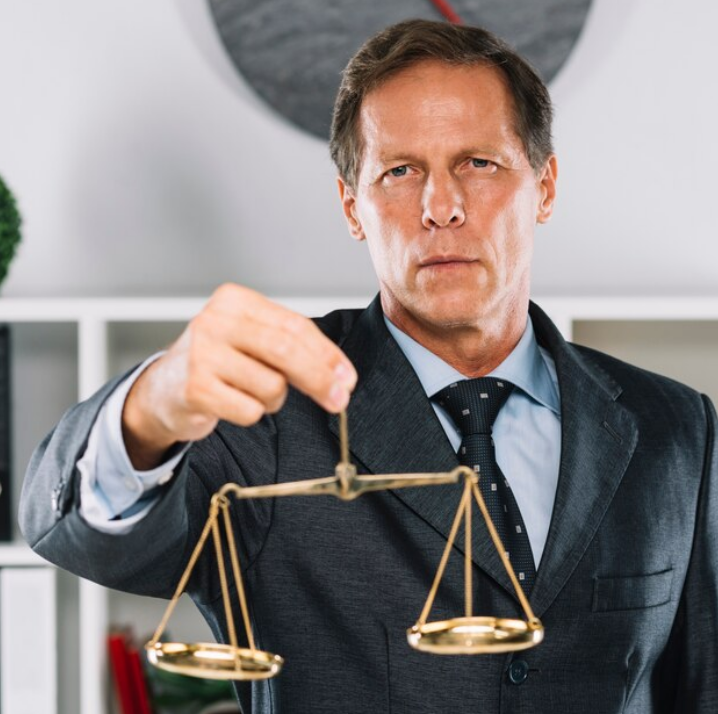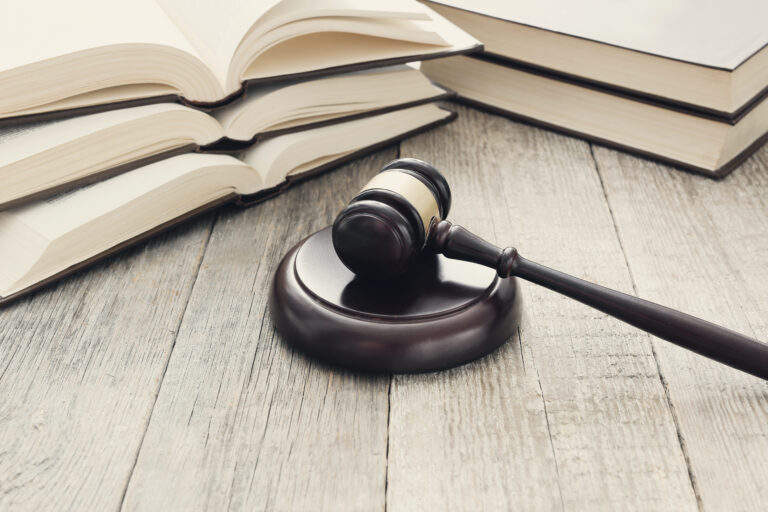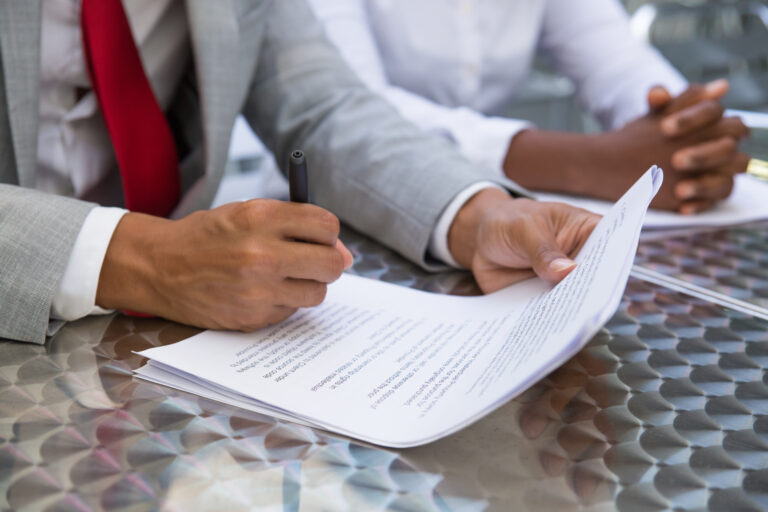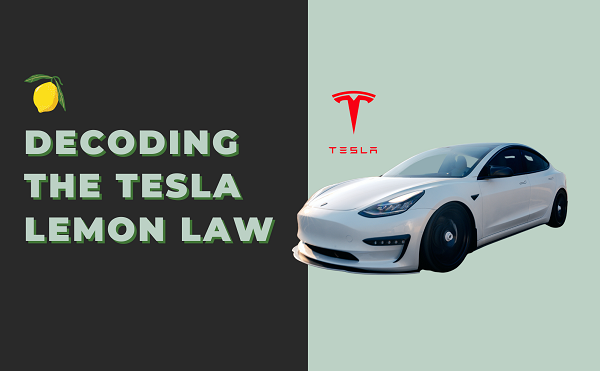Real-Life Tesla Lemon Law Cases and Resolutions
In recent years, Tesla has become synonymous with innovation and luxury in the electric vehicle market. However, like any car manufacturer, they are not immune to production defects and issues that fall under lemon laws. This outline explores real-life Tesla lemon law cases, analyzing the problems encountered, legal arguments utilized, and resolutions achieved.
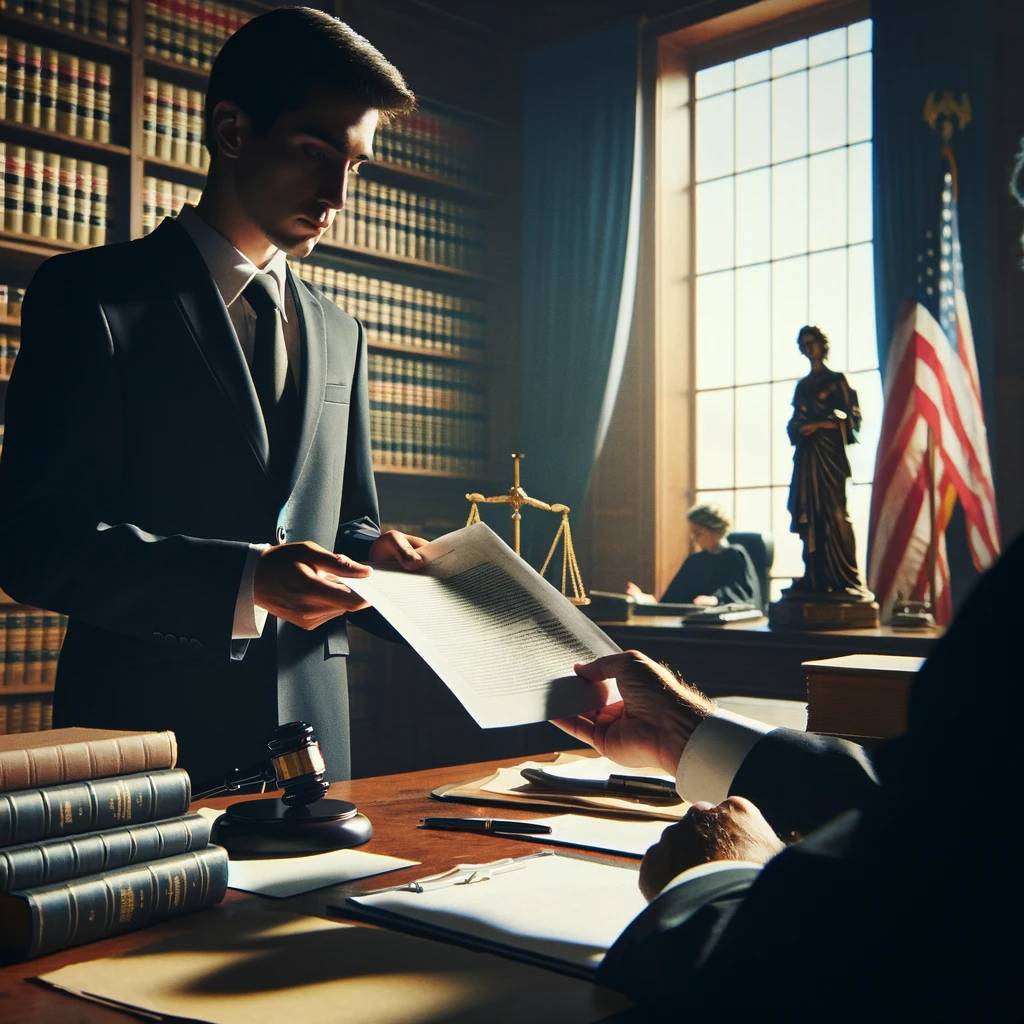
Litigation and Courtroom Resolutions
A. Filing a Lawsuit:
While negotiation, mediation, and arbitration are often preferred for resolving lemon law claims, litigation may become necessary under certain circumstances:
- Unsuccessful Resolution Attempts: If negotiations and mediation fail to reach a satisfactory settlement, or arbitration results in an unfavorable outcome, filing a lawsuit might be the next step.
- Serious Safety Concerns: If the Tesla vehicle’s defects pose a significant safety risk or have resulted in accidents or injuries, a lawsuit can bring immediate attention to the issue and seek appropriate compensation.
- Complex Legal Issues: Disputes involving novel interpretations of lemon laws, breach of warranty claims exceeding contractual limitations, or potential punitive damages often require litigation for comprehensive legal analysis and precedent-setting decisions.
The Litigation Process:
- Complaint and Summons: The plaintiff files a complaint outlining the lemon law violations, details of the vehicle’s issues, and desired remedies. The defendant (Tesla) receives a summons to appear in court.
- Pleadings and Discovery: Each party submits legal documents outlining their arguments and requests. The discovery phase involves sharing evidence, witness depositions, and expert reports to build each party’s case.
- Motions and Pre-Trial Conferences: Motions may be filed to dismiss the case, exclude evidence, or resolve specific legal issues before trial. Pre-trial conferences help streamline the trial process and potentially encourage settlement discussions.
- Trial: If no pre-trial resolution is reached, the case goes to trial. Both parties present evidence, witness testimonies, and closing arguments before the judge or jury.
- Verdict and Judgment: Based on the presented evidence and arguments, the judge or jury issues a verdict in favor of the plaintiff or defendant. The court then issues a judgment outlining the awarded remedies, which could include vehicle buyback, replacement, repairs, and/or compensation for damages.
Potential Risks and Rewards:
Risks:
- Cost and Time: Litigation can be expensive, involving attorney fees, court costs, expert witness fees, and other expenses. It can also be a lengthy process, taking months or even years to reach a final verdict.
- Uncertainty of Outcome: While strong evidence and compelling arguments can increase the chances of success, there is no guarantee of victory in court.
- Emotional Stress: Legal battles can be emotionally draining, demanding significant time and effort from the plaintiff.
Rewards:
- Full Recovery: Litigation can potentially achieve the most comprehensive remedies, including full buyback or replacement of the vehicle, compensation for all related damages, and possibly punitive damages in certain cases.
- Publicity and Precedent: High-profile court cases can bring public attention to Tesla’s lemon law issues and potentially influence future legal interpretations and industry practices.
- Justice and Vindication: For some plaintiffs, achieving a court victory can provide a sense of justice and vindication for the inconveniences and financial losses they experienced.
B. Trial and Appeals:
Trial Process:
- Opening Statements: Each attorney summarizes their case’s key points and arguments to the judge or jury.
- Presentation of Evidence: Both sides present documents, expert witness testimony, and other evidence to support their claims.
- Witness Testimony: Witnesses directly involved in the case, such as repair technicians or other owners with similar issues, are called to testify.
- Closing Arguments: Each attorney summarizes their case, highlighting key evidence and urging the judge or jury to rule in their favor.
- Deliberation and Verdict: The judge or jury deliberates privately, considering all presented evidence and arguments before reaching a verdict.
Appeals and Post-Trial Motions:
- Appeals: If the losing party disagrees with the court’s decision, they can appeal to a higher court, arguing that legal errors were made during the trial process.
- Post-Trial Motions: Motions for reconsideration, judgment as a matter of law, or new trial can be filed if there are grounds to challenge the verdict or judgment based on specific legal arguments.
Notable Court Rulings and Precedents:
- California – Evans v. Tesla Motors, Inc. (2019): This case established that software issues affecting Tesla’s Autopilot system can qualify as “nonconformities” under California’s lemon law, paving the way for future claims based on technology malfunctions.
- Wisconsin – Montgomery v. Tesla Motors, Inc. (2023): This ongoing case is the first to seek double damages under Wisconsin’s lemon law against Tesla. The outcome could set a precedent for similar claims in other states.
- Federal – Magnuson-Moss Warranty Act: This federal law covers implied warranties of merchantability and fitness for a particular purpose, often invoked in lemon law cases to argue that the vehicle did not meet basic consumer expectations.
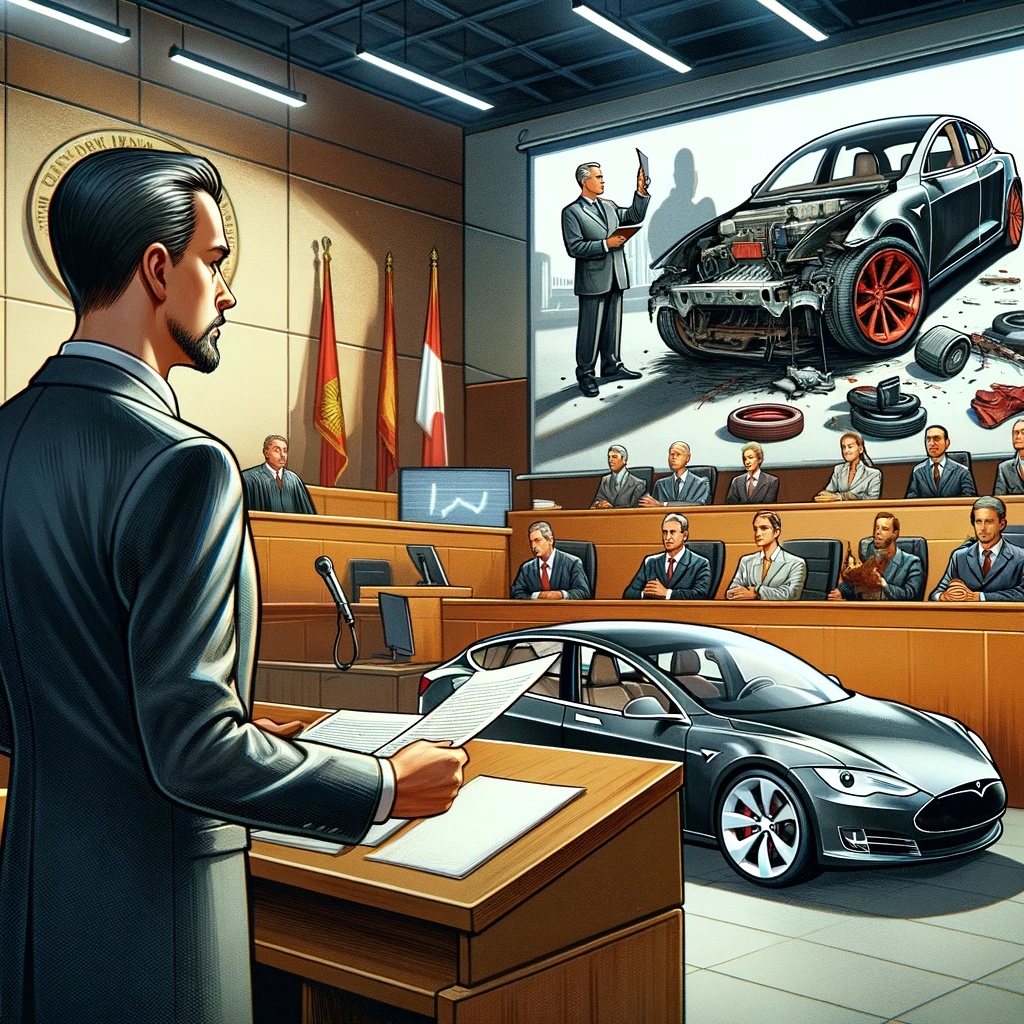
Strategies for Pursuing a Tesla Lemon Law Claim
A. Identifying a Lemon Law Case:
1. Qualifying Criteria:
- Number of Repair Attempts: Most states have a threshold for “reasonable number of repair attempts” before a vehicle qualifies as a lemon. This can range from 4 attempts within the first year/12,000 miles to 8 attempts in a longer period. Specific numbers will vary by state.
- Severity of Defects: Not all issues automatically qualify as lemon law defects. The defects must substantially impair the vehicle’s use, value, or safety. This could include:
- Battery issues: Significant range reduction, rapid degradation, charging malfunctions.
- Autopilot/FSD problems: System disengagement, phantom braking, accidents caused by system errors.
- Manufacturing defects: Recurring mechanical problems, paint flaws, interior quality issues significantly impacting the vehicle’s value.
- Other safety-related concerns: Repeated brake failures, steering problems, electrical issues.
2. Gathering Evidence:
- Detailed Records: Keep meticulous records of all repair attempts, including dates, descriptions of issues, service notes, and contact information for service personnel.
- Documentation: Photographs and videos of the defects can be highly valuable, especially for visual issues like paint blemishes or interior damage.
- Communication: Maintain email trails and copies of any written communication with Tesla customer service or dealerships regarding the issues.
- Consumer Complaints: Check online forums and complaint databases for similar issues reported by other Tesla owners. This can build evidence of a wider pattern of defects.
3. Seeking Legal Counsel:
- Expertise in Lemon Law: Engaging a lawyer experienced in lemon law litigation and automotive issues is crucial. They can understand the specific laws in your state, navigate legal procedures, and build a strong case for you.
- Initial Consultation: Many lemon law firms offer free consultations to assess your case and advise if you have a potential claim.
B. Building a Strong Case:
1. Filing a Claim:
- Pre-filing Requirements: Some states require mediation or arbitration attempts before filing a lawsuit. Your lawyer will guide you through these steps and deadlines.
- Formal Complaint: Your lawyer will draft a formal complaint outlining the defects, repair attempts, and legal arguments supporting your lemon law claim.
- Serving the Complaint: The complaint is served to Tesla, initiating the legal process.
2. Supportive Evidence:
- Repair Records: These are critical documents proving the number of repair attempts and the nature of the issues.
- Expert Reports: In complex cases, expert reports from engineers or mechanics can further validate the severity of the defects and their impact on the vehicle.
- Consumer Complaints: Evidence of similar issues reported by other Tesla owners can strengthen your case by demonstrating a pattern of defects.
- Witness Testimony: If others have witnessed the problems with your Tesla (e.g., passengers experiencing Autopilot malfunctions), their testimony can be valuable.
3. Legal Arguments and Strategies:
- Express Warranties: Your lawyer will analyze whether Tesla’s written warranty explicitly covers the encountered defects.
- Implied Warranties of Merchantability and Fitness: These legal principles imply that the vehicle should be usable and fit for its intended purpose. If the defects significantly impair its functionality, these warranties may be breached.
- Unreasonable Number of Repair Attempts: If your Tesla has undergone repairs for the same issue exceeding the state’s “reasonable” threshold, it can be a strong argument for a lemon law claim.
- Lemon Law Provisions: Lawyers will thoroughly understand the specific provisions of your state’s lemon law to find the most compelling arguments for your case.
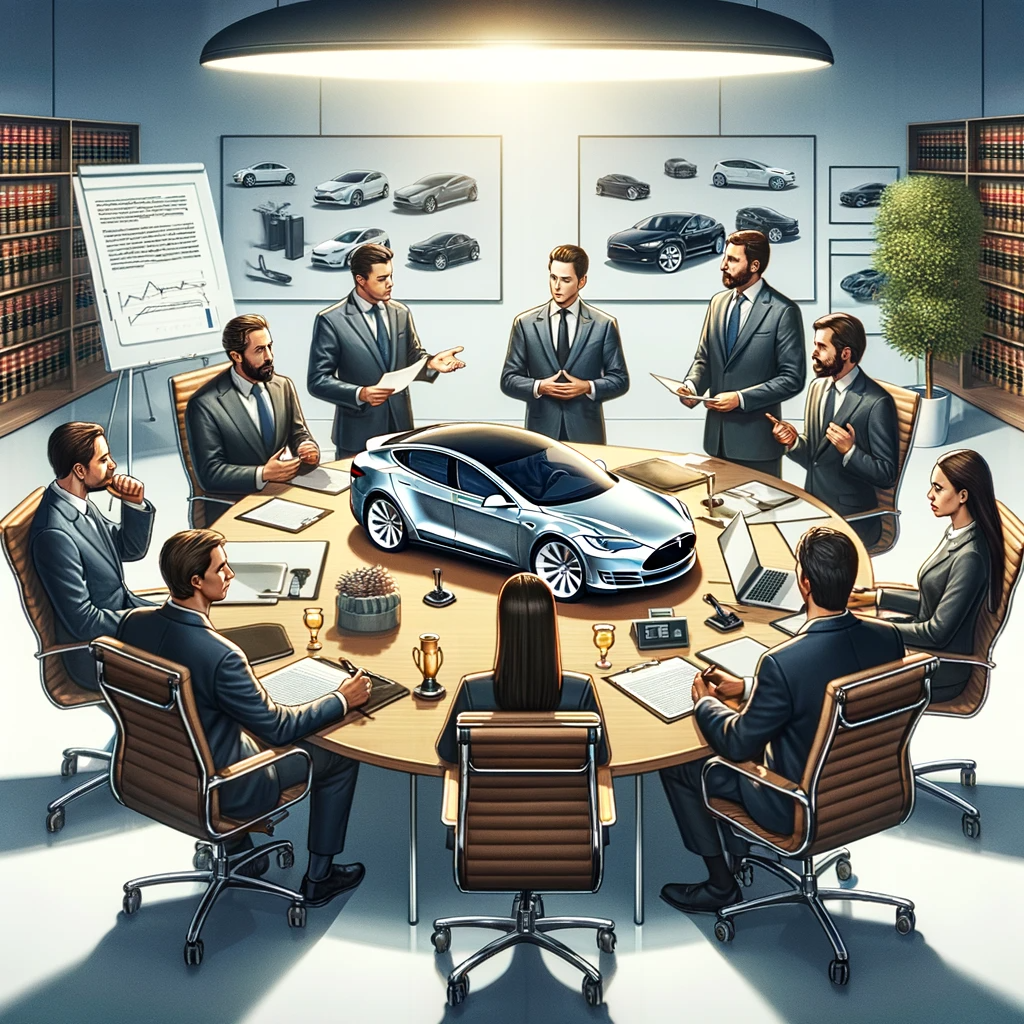
Alternative Dispute Resolution for Tesla Lemon Law Cases
A. Negotiation and Mediation: Seeking Common Ground Through Dialogue
Benefits:
- Faster and less expensive: Both negotiation and mediation offer quicker resolutions than litigation, minimizing legal fees and court costs.
- Less acrimonious: Avoiding the adversarial nature of lawsuits can preserve relationships between consumers and Tesla dealerships.
- Flexibility: Negotiations and mediations allow for creative solutions that may not be available through court rulings.
- Potential for full recovery: Successful mediation can still result in buybacks, replacements, or significant financial compensation.
Limitations:
- Power imbalance: Tesla dealerships may have more resources and experience in negotiations, requiring consumers to be well-prepared and potentially consult with a lemon law attorney.
- Limited scope: Negotiations may not address all underlying legal issues, potentially leaving some concerns unresolved.
- Uncertainty of outcome: Success depends on the willingness of both parties to compromise and reach an agreement.
Mediation Process:
- Neutral third party: A trained mediator guides the discussion and facilitates communication between the consumer and Tesla representative.
- Open communication: Both parties present their arguments and concerns in a safe and structured environment.
- Exploration of options: The mediator suggests and evaluates potential solutions, such as vehicle buybacks, repairs, or financial compensation.
- Settlement agreement: If both parties agree, a signed settlement document formalizes the terms of the resolution.
Examples of Successful Mediations:
- California case: A Tesla Model S owner experiencing numerous battery and charging issues successfully settled through mediation, receiving a full buyback and compensation for inconvenience.
- Florida case: A Model 3 owner facing persistent Autopilot malfunctions reached a settlement with Tesla through mediation, securing repairs and extended warranty coverage.
B. Arbitration: A More Formal Approach to Dispute Resolution
Outline of the Arbitration Process:
- Selection of arbitrator(s): The parties agree on a neutral arbitrator, sometimes chosen from a list provided by an arbitration service.
- Presentation of evidence: Both parties submit evidence, including repair records, expert reports, and witness testimonies.
- Legal arguments: Attorneys present legal arguments regarding the lemon law provisions and their application to the case.
- Arbitration award: The arbitrator issues a binding decision, resolving the dispute and determining any remedies (e.g., buyback, compensation).
Advantages of Arbitration:
- Efficiency: Arbitration is typically faster than litigation, with expedited processes and reduced court delays.
- Lower costs: Compared to court proceedings, arbitration often involves lower filing fees and legal expenses.
- Neutrality: Unlike in some courts, judges in arbitration are chosen by both parties, potentially enhancing perceived fairness.
- Confidentiality: Arbitration proceedings are private, protecting sensitive information from public disclosure.
Disadvantages of Arbitration:
- Limited appeal rights: Arbitration awards are typically final and binding, with limited options for challenging or appealing the decision.
- Discovery restrictions: Compared to courts, discovery processes in arbitration can be more limited, potentially restricting access to evidence.
- Potential for bias: While chosen by both parties, arbitrators may have biases influencing their decisions, depending on their experience and background.
Binding Nature of Arbitration Awards:
It is crucial to understand that arbitration awards are legally binding and enforceable. Once an award is issued, challenging it becomes difficult and often requires demonstrating specific procedural errors or arbitrator misconduct.
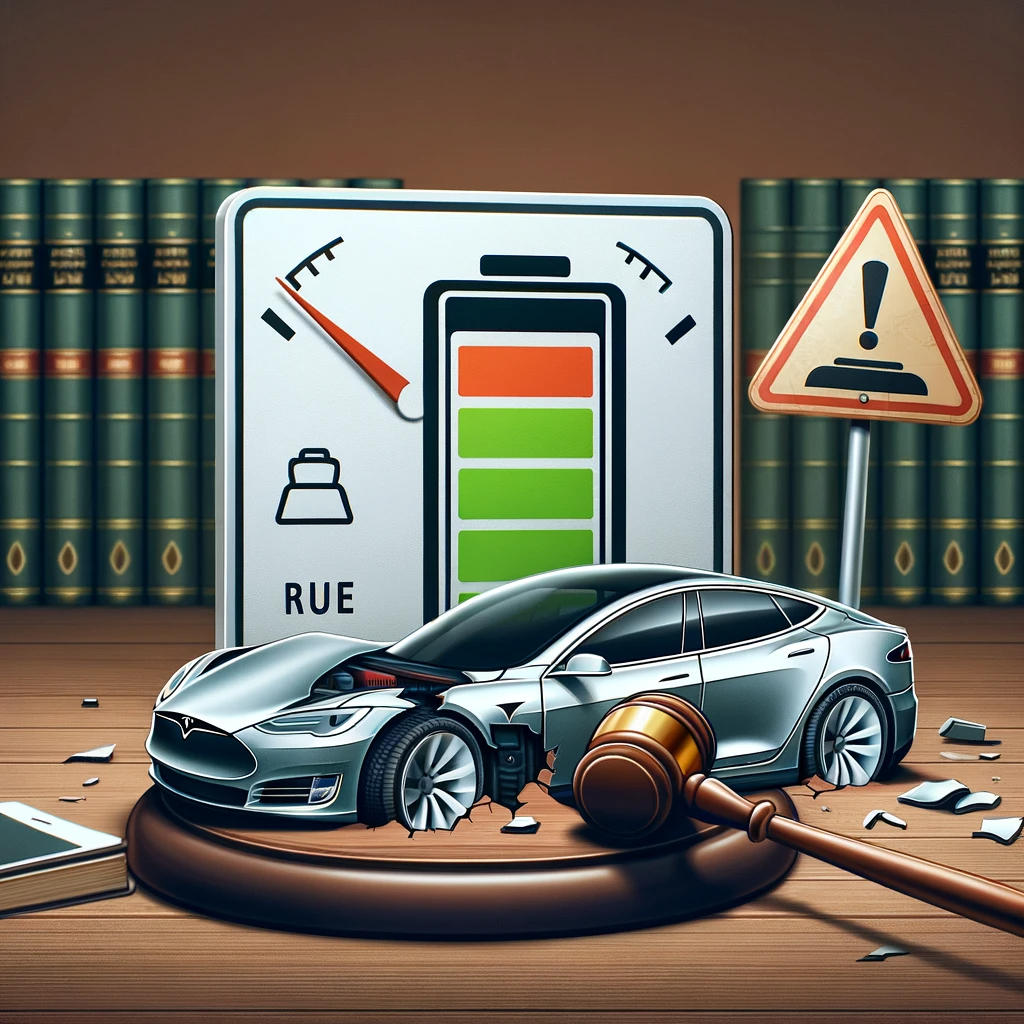
Common Tesla Lemon Law Complaints
A. Battery and Range Issues:
- Common Complaints:
- Battery degradation: This is a major concern for electric vehicle owners, as batteries naturally lose capacity over time. Tesla owners have reported significant reductions in range after just a few years of ownership.
- Reduced range: Many Tesla owners have complained that their vehicles do not achieve the advertised range, especially in cold weather or when using certain features like Autopilot.
- Charging problems: Some Tesla owners have encountered issues with slow charging times, difficulty finding compatible charging stations, and even fires related to charging equipment.
- Legal Arguments:
- Implied warranty of merchantability: This warranty states that a product must be fit for the ordinary purposes for which it is used. Tesla owners may argue that their vehicles are not merchantable if they experience significant battery degradation or reduced range that makes them impractical to use as everyday vehicles.
- Implied warranty of fitness for a particular purpose: This warranty applies if a buyer informs the seller of a specific purpose for which they intend to use a product and the seller agrees to sell the product for that purpose. Tesla owners who purchased their vehicles for long-distance travel may argue that their vehicles are not fit for their intended purpose if they experience significant range reductions.
- Resolutions:
- Buybacks: Tesla has agreed to buy back some vehicles from owners who have experienced severe battery degradation or other issues.
- Repairs: Tesla has also repaired some vehicles under warranty to address battery and range problems.
- Compensation: In some cases, Tesla has provided compensation to owners for the diminished value of their vehicles due to battery degradation or range issues.
B. Autopilot and FSD System Malfunctions:
- Common Complaints:
- Phantom braking: This is a serious issue where Autopilot or FSD systems suddenly apply the brakes for no apparent reason, which can cause accidents.
- Lane departure: Some drivers have reported that Autopilot or FSD systems have steered their vehicles out of their lane, sometimes into oncoming traffic.
- Accidents: There have been several accidents involving Tesla vehicles on Autopilot or FSD, some of which have been fatal.
- Legal Arguments:
- Product liability: Tesla could be held liable for accidents caused by Autopilot or FSD system malfunctions if it can be shown that the systems were defective or that Tesla failed to adequately warn drivers of the risks associated with using them.
- Consumer expectations: Consumers may argue that Autopilot and FSD systems are marketed as being more capable than they actually are, and that Tesla is therefore liable for accidents caused by drivers who relied on these systems to a greater extent than they should have.
- Software updates: Tesla has released software updates to address some Autopilot and FSD system issues. However, this raises questions about whether Tesla knew about the problems before the updates were released and whether the company did enough to warn drivers of the risks.
- Legal Precedents and Ongoing Litigation:
- There are currently several lawsuits pending against Tesla related to Autopilot and FSD system malfunctions. These cases could set important legal precedents for future claims.
- The National Highway Traffic Safety Administration (NHTSA) is also investigating Tesla’s Autopilot and FSD systems. The NHTSA’s findings could lead to recalls or other regulatory action against Tesla.
C. Manufacturing Defects and Quality Control Issues:
- Common Complaints:
- Paint defects: Tesla has been plagued by reports of paint defects, such as peeling, cracking, and bubbling.
- Interior fit and finish problems: Some Tesla owners have complained about poor interior quality, such as misaligned panels, loose trim pieces, and cheap-looking materials.
- Recurring mechanical issues: Some Tesla owners have experienced a variety of recurring mechanical problems, such as suspension issues, brake problems, and electrical problems.
- Legal Arguments:
- Express warranty: Tesla’s warranty covers certain manufacturing defects for a specific period of time. Owners who experience these defects may be entitled to repairs or replacements under warranty.
- Reasonable number of repair attempts: Lemon laws in many states allow consumers to reject a vehicle if it has been repaired for the same problem a certain number of times. Tesla owners who have had their vehicles repaired for the same defect multiple times may be able to qualify for a lemon law buyback or replacement.
- Settlements and Court Rulings:
- There have been a number of settlements and court rulings in favor of Tesla owners who have experienced manufacturing defects.
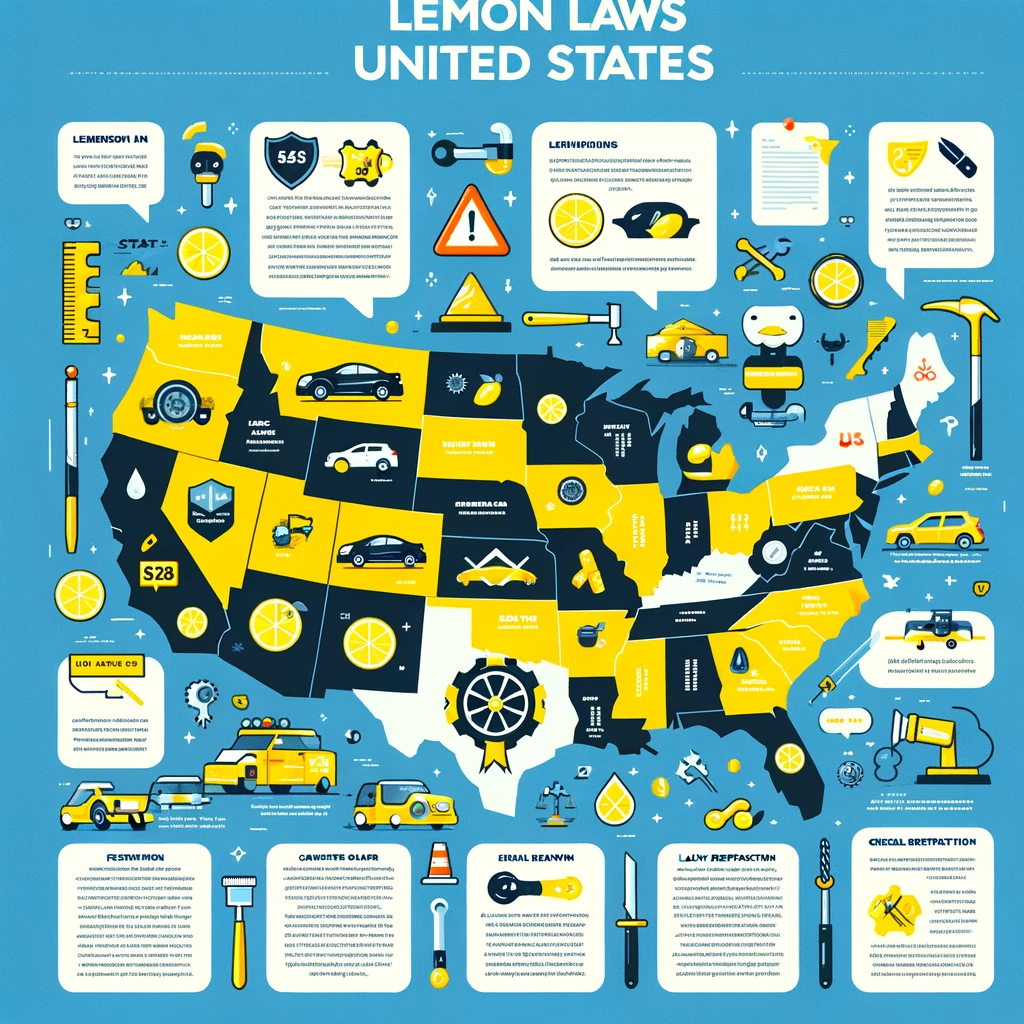
Understanding Lemon Laws
Overview of Lemon Laws in the United States:
- Purpose: Lemon laws protect consumers from purchasing and being stuck with vehicles deemed “lemons” due to significant or recurring defects that cannot be adequately repaired. These laws aim to incentivize manufacturers to build and sell reliable vehicles by providing remedies for those who encounter persistent problems.
- Coverage: Lemon laws vary significantly by state, covering different types of vehicles (e.g., new cars, used cars, motorcycles) and outlining specific criteria for qualifying as a “lemon.” Typically, the laws require:
- The vehicle to be under a manufacturer’s warranty.
- A certain number of repair attempts for the same issue (often 4 or more) within a specified timeframe (e.g., 18 months or 18,000 miles).
- The defect to substantially impair the vehicle’s use, value, or safety.
- Remedies: Depending on the state and circumstances, lemon laws allow consumers to obtain various remedies, including:
- Repurchase: The manufacturer buys back the vehicle from the consumer at the full purchase price, potentially including taxes and fees.
- Replacement: The manufacturer replaces the defective vehicle with a new one of the same or similar model.
- Refund: The consumer receives a full or partial refund, depending on the extent of the depreciation.
- Compensation: In some cases, consumers may be eligible for additional compensation for incidental damages, such as rental car expenses or lost wages.
- Prominent Differences: Some key differences between state lemon laws include:
- Coverage of used cars: Some states cover used cars, while others only cover new ones.
- Length of warranty period: The timeframe for qualifying as a lemon under the warranty can vary.
- Definition of “substantial impairment”: Different states have varying interpretations of what constitutes a significant enough defect to qualify.
- Arbitration requirements: Some states require lemon law claims to go through arbitration before proceeding to court.
- Federal Lemon Laws: Several federal laws offer additional protection for consumers, including:
- Magnuson-Moss Warranty Act: This law regulates manufacturer warranties and prohibits unfair or deceptive practices.
- Song-Beverly Consumer Warranty Act: This law applies to California and provides extensive consumer protection rights for both new and used cars.
Applying Lemon Laws to Tesla:
- Unique Challenges: Applying lemon laws to electric vehicles, like Teslas, can be complex due to:
- Technology: The relative newness of EV technology presents challenges in defining and diagnosing issues.
- Software updates: Tesla relies heavily on software updates, which can introduce new problems or change existing features.
- Data collection: Tesla vehicles collect extensive data, which requires understanding how manufacturers use and interpret this data in lemon law cases.
- Interpretations of Lemon Law Provisions: Courts have taken various approaches to applying lemon laws to Tesla vehicles, considering factors like:
- Battery warranties: Specific provisions regarding battery degradation and range limitations.
- Autopilot/FSD malfunctions: The evolving nature of autonomous driving technology and consumer expectations.
- Recurring software issues: Whether software updates address or exacerbate underlying problems.
- Case Studies:
- Successful Claims:
- A California owner received a repurchase after their Model S experienced repeated battery range issues that significantly deviated from advertised performance.
- A Florida owner secured a replacement Model X after facing numerous problems with the falcon wing doors and interior fit and finish.
- Unsuccessful Claims:
- A New York owner’s lemon law claim based on Autopilot disengagement issues was dismissed due to the court finding the technology still in development and subject to disclaimers.
- A Texas owner’s claim failed based on arguments that battery degradation over time was a normal occurrence for EVs.
- Successful Claims:
Remember: This information is for general purposes only and does not constitute legal advice. Always consult with an experienced lemon law attorney in your state for specific guidance on your situation.

